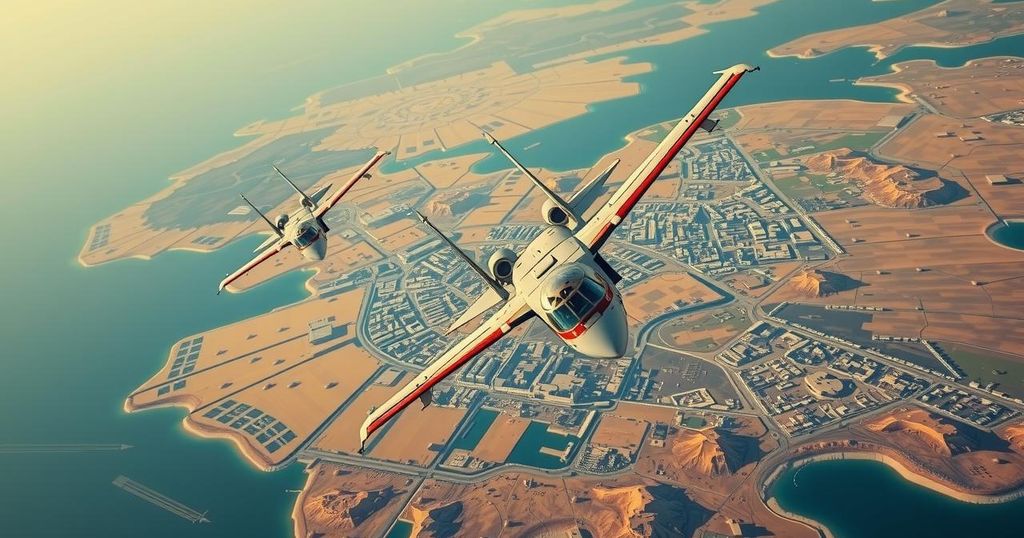Israel has launched airstrikes on military targets in Iran, retaliating for Iran’s missile attack on October 1. This incident raises the potential for an escalation in the conflict amid ongoing violence involving Iranian-backed militant groups such as Hamas and Hezbollah. The situation reflects decades of hostility between the two nations, exacerbated by recent developments that threaten broader regional stability.
On Saturday early morning, Israel executed a series of airstrikes on key military sites in Iran as retaliation for a significant missile attack launched by the Islamic Republic against Israel on October 1st. The airstrikes resulted in audible explosions within Tehran, although immediate reports regarding damage or casualties were not available. As tensions between the two nations escalate, this marked a critical moment, given that it is the first time in decades that Israel has openly attacked Iran since the prolonged conflict with Iraq in the 1980s. The Israeli military confirmed that the strikes focused on missile manufacturing facilities responsible for the offensive missile assault against Israel, alongside operations targeting surface-to-air missile sites and additional aerial capacities of Iran. Israel’s military spokesperson, Rear Adm. Daniel Hagari, emphasized that the nation has the right to defend itself against the ongoing aggression from Iran and its affiliates in the region, claiming that Iran has persistently assaulted Israel since the beginning of October. Notably, prior assessments by the Biden administration had suggested that Iran’s nuclear and oil infrastructures would be spared from Israeli strikes to prevent further escalation of conflicts in the region. While Iranian state media acknowledged the air defenses responding to explosions, it refrained from revealing substantial information regarding casualties or damage, opting instead to display mundane scenes in Tehran to diminish the perceived severity of the strikes. Eyewitness accounts corroborated reports of multiple explosions within the city. Fearing a further escalation in hostilities, Iran promptly closed its airspace, leading to a noticeable absence of commercial flights above its territory and neighboring regions. As these developments unfolded, the Biden administration remained vigilant, with President Joe Biden receiving regular updates on the situation. This airstrike comes amidst a widespread ongoing conflict involving various militant groups, including Hamas and Hezbollah, which are supported by Iran and have been waging war against Israel. Since the onset of spiraling violence after the October 7 attacks by Hamas, Israel has aimed to neutralize threats from Hezbollah while countering ongoing attacks from various factions aligned with Iran. More than four decades of enmity marked by a series of covert operations and direct confrontations underscore the complexity of the relationship between Israel and Iran, where recently, border skirmishes have intensified following the public escalation of their confrontations. The looming risk of a broader conflict represents a significant concern, particularly for the U.S. due to its strategic military interests in the region.
The relationship between Israel and Iran has been fraught since the 1979 Islamic Revolution, with each nation viewing the other as a primary threat. Israel perceives Iran’s nuclear ambitions, support for militant groups like Hamas and Hezbollah, and aggressive rhetoric aimed at Israel’s destruction as core issues that necessitate a defensive posture. Over the years, both nations have engaged in a so-called ‘shadow war’, marked by covert operations, including assassinations and cyberattacks. The recent escalations come amid an atmosphere of heightened violence in the Middle East, particularly influenced by the activities of Iranian-supported militant factions in reaction to Israeli military actions, particularly in Gaza and Lebanon.
Israel’s recent airstrikes on Iran signify a dangerous potential escalation in the longstanding conflict between the two nations, coming on the heels of a retaliatory missile attack by Iran. With Iran’s ongoing support for militant groups in the region and the volatile situation in Gaza and Lebanon, the stakes have risen significantly. The actions taken could not only affect direct relations between Israel and Iran but could also draw in broader regional players, including the United States, increasing the likelihood of a more extensive military confrontation. The international community now watches closely as both nations navigate this precarious chapter in their contentious history.
Original Source: www.wral.com






